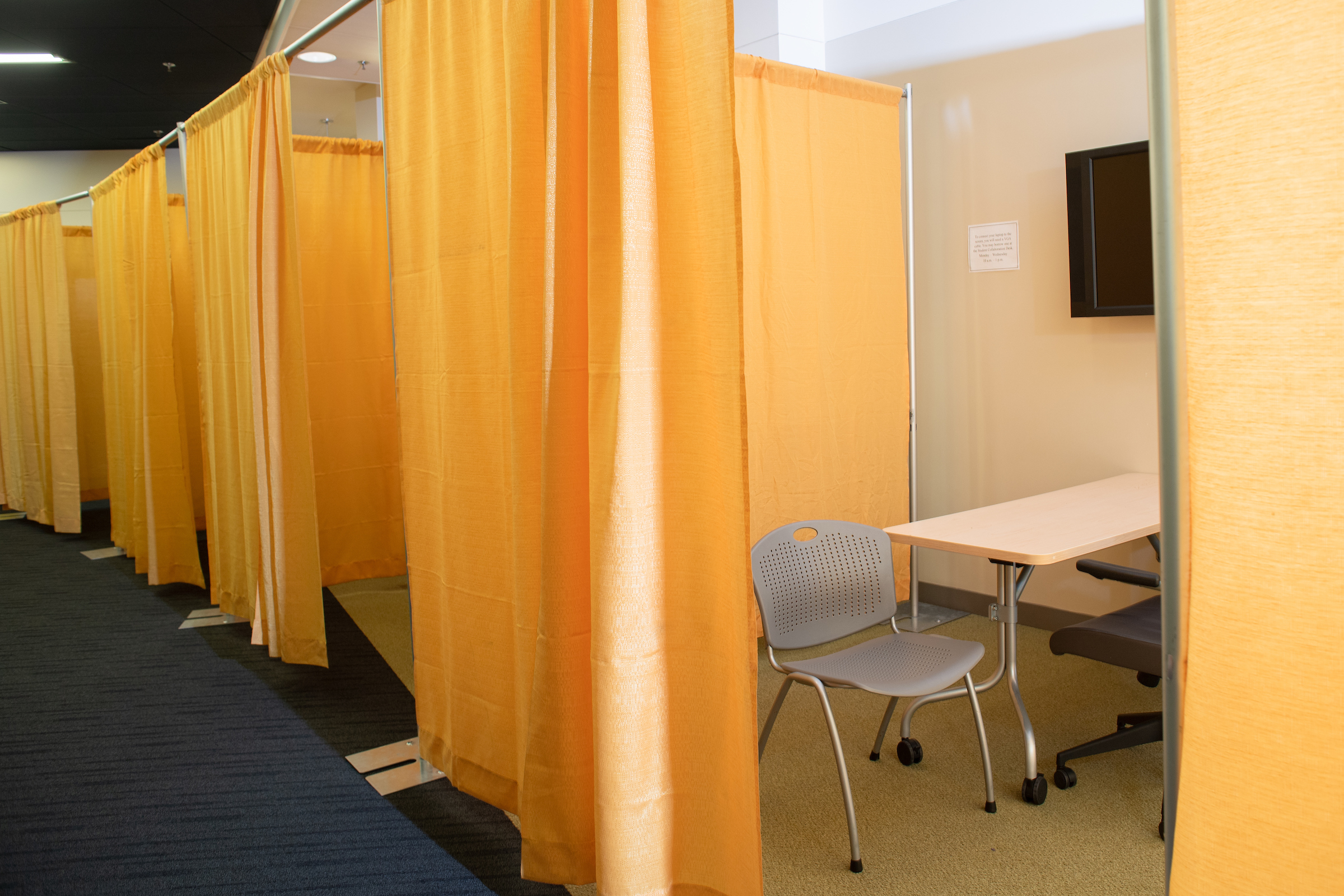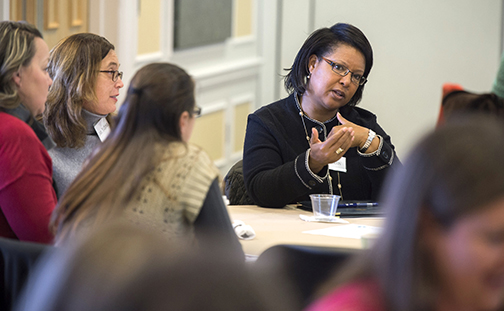Environmental health professionals provide additional, much-needed pandemic care
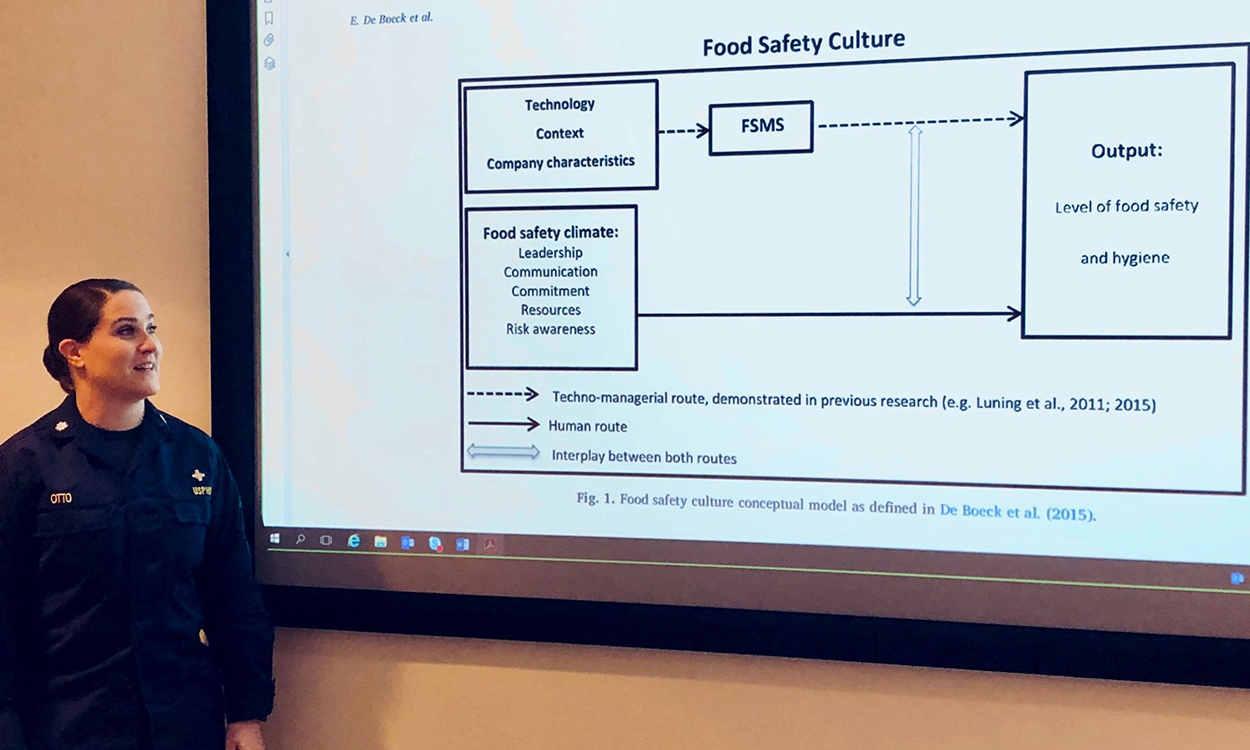
Jessica Otto leads a training session.
The COVID-19 pandemic has been a public health crisis of historic portions, with the phrase "frontline workers" becoming a large part of the daily lexicon.
And the Environmental Health Program at Western Carolina University has contributed its fair share of professionals to those ranks at the local, state and national levels.
"Any given day of this profession can change, based on events that affect public health," said Geraldine Riouff, assistant professor in the Environmental Health Program. "One day you are all set to conduct a health inspection at a nursing home or food service vendor and a gas leak occurs that affects the water supply. Or ... a crisis of pandemic proportions occurs and you find yourself in the field providing guidance to facility operators, by being the voice for the public when they would otherwise not have one."
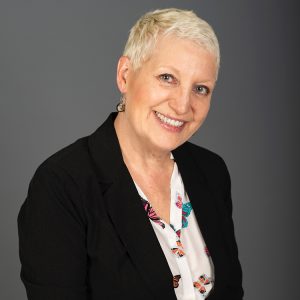
Geraldine Riouff
In addition to being an instructor in the program, Riouff also is an alumna. She has extensive experience in the public health sector, working with departments in Wake, Chatham and Jackson counties after earning her in degree in 2000.
"The four main ingredients for this practice is to possess scientific-based knowledge, integrity, trust and good communication skills," Riouff said. "WCU's Environmental Health Program readies students for this ever-changing field of practice by providing them with the foundation and tools necessary to rise up to the occasion, protect public health on any given day and face the challenges that come their way."
In Winston-Salem, Shannon Maloney is part of an effort to house members of a homeless population that has either tested positive, appear symptomatic or have been exposed to someone who has tested positive. A 2018 Environmental Health Program graduate, she is a registered environmental health sanitarian with the Forsyth County Health Department, but currently is serving as a shelter manager.
During a break from her temporary assignment, Maloney reflected on her new role. "In our studies at Western, we learned a lot about many different subjects," she said. "That has helped me in my work today. Although I am generally doing inspections of restaurants, I had the confidence and knowledge to switch to something out of my normal work environment. I also want to point out that (this field) generally does not get much credit. I want to tell my colleagues, don't be discouraged, no matter how small your contribution to helping your community is. You are still contributing and that is extremely important."
The pandemic has highlighted the need for environmental health professionals as a needed part of preventing diseases, a vital role in protecting public health, she said.
Victoria Boyer, a 2018 program alumna, agreed.
"We have been working diligently over the past two months to ensure that the health and safety of our associates is our number one priority," said Boyer, a 2018 graduate who is the environmental health and safety manager at Resistoflex, a McDowell County-based plastic-lined piping products supplier. "We have taken measures that include mandatory face masks at all times, hired an extra cleaning crew to disinfect high-traffic areas and touch points throughout the day, restricted visitors to essential personnel, reduced the number of on-site office employees, and continued communication and reinforcement of social distancing, which all began at the end of March.
"This is an unprecedented time and uncharted territory for everyone, so we are continuing to flow and adapt as new guidelines are implemented in correlation with our government. It has been difficult navigating as there is no clear end in sight, but we will continue to push through until there is," she said.
The encompassing and global reach of the pandemic has highlighted how everyone is a stakeholder in public health, said Jessica Otto, an environmental health officer with the U.S. Public Health Service working with the Food and Drug Administration in College Park, Maryland. "Everyone has something to bring to the table and is essential to the development and implementation of the plan," she said. "That’s what we’re doing at the federal level, consulting with stakeholders, anticipating needs and developing tools and strategies in concert with sister agencies, state and local health departments, trade and professional associations, and consumer groups so we can mitigate the risks together as one team, to protect the workforce and the public."
People are living through a once in a 100-year public health event, and environmental and public health professionals have to be flexible and responsive, and confident that the theoretical knowledge gained through training, and the real-world experience from previous events, is enough to make sound decisions and make an impact.
"Pandemic history, strategy, response and recovery is a basic foundational part of every public health curriculum, but that doesn’t mean we’ve been able to apply that knowledge in real life," said Otto, a 2004 WCU graduate. "This isn’t a local or regional event like we are used to responding to. This isn’t an epidemic in some far-flung part of the world. This is affecting everyone worldwide, which presents a new set of challenges and opportunities like no other public health emergency I’ve responded to before."
WCU is one of only 28 environmental health degree programs accredited by the National Environmental Health Science and Protection Accreditation Council and one of 31 by the Association of Environmental Health. It is recognized as a leading program by industry professionals in the nation.
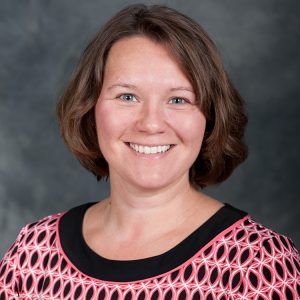
Kim Hall
"The profession is committed to improving public health by protecting the very things that are vital to life ― food, air, shelter and water ― whether it's on a day-to-day basis or during the COVID-19 pandemic," said Kim Hall, program director and assistant professor. "The COVID-19 pandemic has created a public health emergency and highlighted an existing need for environmental health practitioners. Graduates of WCU's Environmental Health Program are on the frontlines of responding to the pandemic and are working from many angles to slow the spread of the virus."
These are the practitioners who are conducting testing and contact tracing campaigns, evaluating trends in disease data to inform policymakers and responding to outbreaks in congregate living environments and occupational settings to stop disease spread, Hall said. The work also includes moving forward, as steps are taken to reopen segments of society. Environmental health professionals are providing guidance to restaurants and other businesses to ensure safe reopening, overseeing worker safety in essential businesses and educating the general public on ways in which they can help slow the spread of the virus.
"Most importantly, our graduates are engaged citizens who have a strong passion and desire to serve their communities. They are competent and proficient scientists who successfully apply their technical knowledge to prevent disease and disability, respond to public health emergencies and promote public health through education," Hall said. "These are the professionals whose work has always been vital to the improvement and protection of public health and whose work will continue to be vital as society navigates to a 'new normal' in the wake of COVID-19 pandemic. The need is greater now more than ever for this profession and environmental health practitioners, and WCU's Environmental Health Program will continue to meet those needs."
For more information, contact Hall at 828-227-2654 or kkhall@email.wcu.edu.
